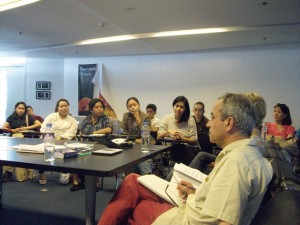
THE TEACHERS said most of their Filipino students want to tackle the conflict between tradition and modernity. Independent Filmmakers Multipurpose Cooperative
Now on its third year, the annual documentary workshop, spearheaded by De La Salle-College of Saint Benilde and the Independent Filmmakers Multipurpose Cooperative (IFC), tapped experts from two countries, France and Germany, for the first time.
The workshop, which gathered 15 Filipino participants, was made possible with the cooperation of the Goethe Institut and the French embassy.
The first phase of the workshop, which ended last week (April 22), allowed Germany’s Bettina Braun and France’s Yves de Peretti to interact with local docu filmmakers.
(Braun also facilitated last year’s docu workshop, while it was De Peretti’s first time in the Philippines. De Peretti is set to return for the second phase in June, while Braun comes back for the third phase in November.)
Braun was elated because the students “were eager to learn. They were engaged and open to new ideas.”
Unlike last year’s batch, which focused on stories in Metro Manila, this year’s participants have proposed documentaries set in Davao, Cotabato, Iligan, Cebu and Nueva Ecjia, among other provinces.
The experts describe the proposed docus as interesting and diverse.
De Peretti pointed out: “A lot of the stories tackle the conflict between tradition and modernity. We feel that it’s a recurring theme in the participants’ docus.”
Braun agreed: “I noticed the same trend last year: the collision between the Old World and the New World.”
The difference will depend on whether the filmmaker would take “an ethnographic as opposed to a social or a personal approach. The filmmakers would have to decide which road to take,” Braun said.
“We are here to guide and help them find their way,” De Peretti said. “Some are personal stories. One is on the Muslim-Christian issue.”
“Another filmmaker plans to follow a rock band that wants to stage a comeback,” said Braun.
During the weeklong workshop, the experts tried to clarify matters with the participants.
De Peretti said that docus weren’t previously taught in film schools in France, but now there’s a budding interest in the art form.
There is a growing audience for docus, but Braun was quick to point out that if a docu attracted 20,000 viewers, it would’ve been considered a success in Germany, but if a fiction film gathered the same number of people, it would’ve been deemed a flop.
De Peretti conceded that docus are often regarded as a poor cousin of fiction films, but now times are changing.
Braun noted that aspiring filmmakers should know the difference between the usual documentation/reportage seen on TV vis-à-vis a documentary as film.
For a documentary film, “an auteur chooses the visual language for the subject,” she explained.
MENTORS (from left): Yves de Peretti from France, Bettina Braun from Germany and local organizer/film scholar Teddy Co. Independent Filmmakers Multipurpose Cooperative
According to IFC, the workshop encouraged participants “to develop a personal and individual perspective for their chosen subject and to project this through captured images of real life.”
Since the Goethe Institut launched the project in 2010, “up to 20 docus” have been produced with the help of foreign and local experts (such as Teddy Co).
Among those who have taken the workshop were award-winning filmmakers Monster Jimenez, Sari Dalena and Emman de la Cruz.

